Central America
Harris says US wants to work with Guatemala to limit migration

AFP/Editor
US Vice President Kamala Harris said Monday the United States hopes to work with Guatemala to address the root causes of illegal migration by creating “a sense of hope” in the poverty- and violence-plagued country, on her first trip abroad since taking office.
Meeting President Alejandro Giammattei in Guatemala City, Harris said reducing undocumented migration from Central to North America was a priority for US President Joe Biden’s administration.
“Most people do not want to leave the place where they grew up,” loved ones, and people with whom they share a language and culture, Harris said.
But they often do so “either because they are fleeing some harm or because they simply cannot satisfy their basic needs by staying at home,” she added.
Regardless of their reasons for leaving, Harris urged would-be migrants not to make the journey: “Do not come” to the United States, she told them.
“The United States will continue to enforce our laws and secure our borders… If you come to our border, you will be turned back,” she said.
Instead, she proposed that the United States and Guatemala “work together” to find solutions to “long-standing problems.”
Critically, people must be given “a sense of hope that help is on the way,” said Harris.
“It must be coupled with relationships of trust. It must be coupled with tangible outcomes, in terms of what we do as leaders to convince people that there is a reason to be hopeful about their future and the future of their children.”
– Create conditions –
Giammattei said Guatemala wanted to cooperate “to create conditions in Guatemala so that they (young people) can find here the hope they do not have today.”
Harris announced a joint task force on smuggling and human trafficking, a women’s empowerment program, and an anti-corruption task force to help Central American law enforcement prosecute cases.
She rejected Republican criticism of the fact that neither she nor Biden had visited the US southern border, saying she had come to Central America to discuss matters in a “way that is significant and has real results” rather than making “grand gestures.”
Harris, who later flew to Mexico to meet President Andres Manuel Lopez Obrador on Tuesday, said she had told Giammattei the United States would send 500,000 coronavirus vaccines to Guatemala.
Her trip is part of the Biden administration’s promise to implement a more humane immigration policy after the hardline approach taken by his predecessor Donald Trump.
But the Republican opposition has accused Biden of creating a “crisis” on the country’s southern border by failing to rein in migration.
Congress must still decide whether to approve the $861 million Biden has asked for next year as part of a $4 billion plan to tackle the issue.
American officials have in recent days called on Central American countries to defend democracy and fight corruption in a bid to improve conditions at home and thus eliminate a driving factor for migration.
Asked Monday about Guatemala’s anti-corruption stance, Giammattei said: “How many cases of corruption have I been accused of? I can give you the answer: Zero.”
Central America
Guatemala raises police death toll to nine after gang violence escalates
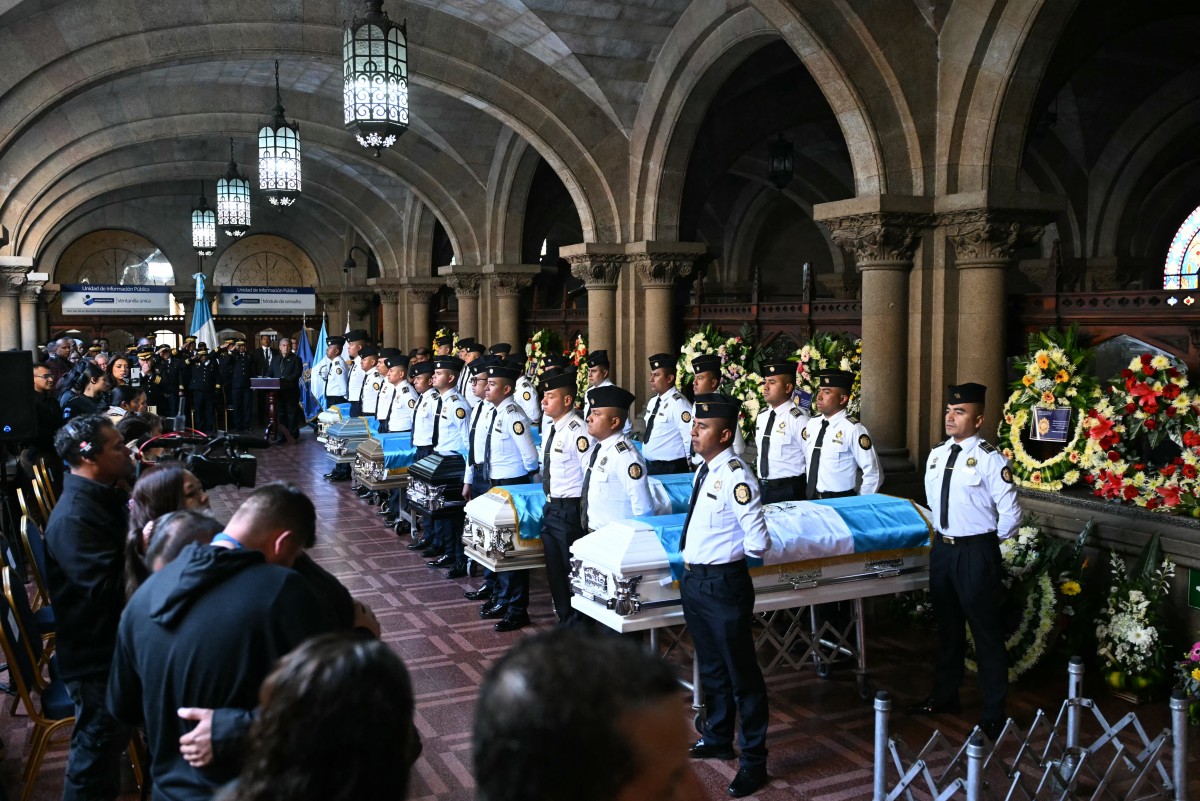
Guatemalan authorities raised the death toll of police officers killed in a wave of gang violence to nine on Monday, after one officer wounded in the attacks died from his injuries. The violence prompted the government to declare a state of siege.
Criminal gangs launched a series of coordinated attacks against police forces across several parts of the country in retaliation for the government’s recapture of three prisons, where gang leaders had been holding dozens of prison guards hostage. Authorities said the hostages were used to pressure officials into transferring gang leaders to facilities with looser security measures.
Eight police officers were killed on Sunday. Another officer, identified as Frayan Medrano, died Monday in a public hospital after being shot while riding a motorcycle with a colleague, who remains in critical condition, according to police and the Ministry of the Interior.
Central America
Guatemala prison uprisings leave 46 guards held by gangs
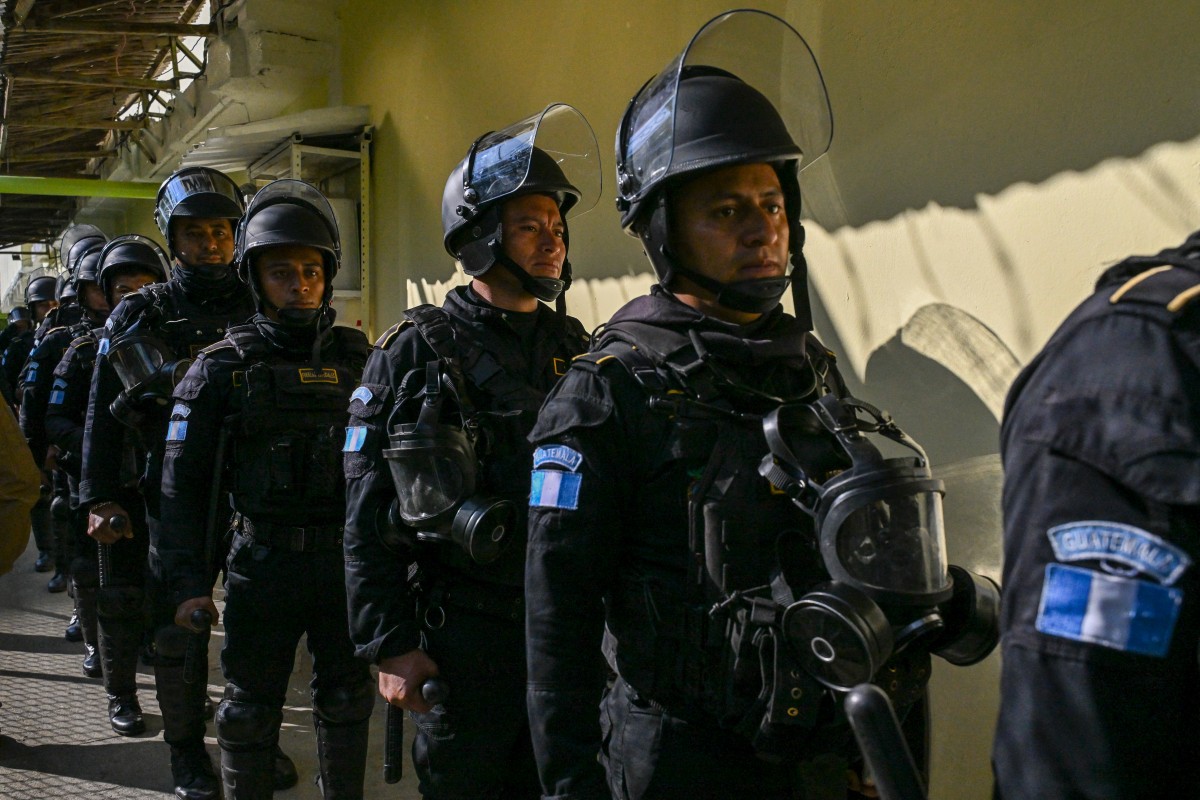
Gang members staged riots, took prison guards hostage and set fires on Saturday at several prisons in Guatemala, in protest over the transfer of their leaders to a maximum-security facility and the implementation of new confinement measures, authorities said.
The Barrio 18 and Mara Salvatrucha (MS-13) gangs — both designated as terrorist organizations by the United States and Guatemala — are accused of contract killings, extortion and drug trafficking. Guatemala’s Minister of the Interior, Marco Antonio Villeda, confirmed that the unrest affected three prison facilities.
Villeda said the riots did not result in any fatalities or injuries, but 46 prison guards are currently being held hostage by gang members.
The minister stated that the government is willing to engage in dialogue to secure the release of the detained personnel, regain control of the prison facilities and ensure that inmates submit to internal regulations and the rule of law.
“Dialogue, not negotiation. We are dealing with terrorist structures that are financed and well organized. These are terrorist groups with whom we will not negotiate. The State is acting with legitimacy and in accordance with the law,” Villeda said.
According to official figures, 18 guards are being held at the Renovación 1 prison and the Preventive Detention Center for Men in Zone 18 — nine at each facility — while another 28 guards are hostages at the Fraijanes 2 prison.
Villeda acknowledged that all three prisons remain under gang control, but stressed that authorities are prioritizing the safety of those being held. “We will guarantee their lives and respect for them. We will take whatever time is necessary to retake control of the prisons,” he said.
The minister also warned that the prison riots are part of what he described as an “orchestrated plan,” which has included road blockades in other parts of the country and the destruction of penitentiary infrastructure and records.
Central America
Bukele warns crime can become a ‘parallel government’ during visit to Costa Rica
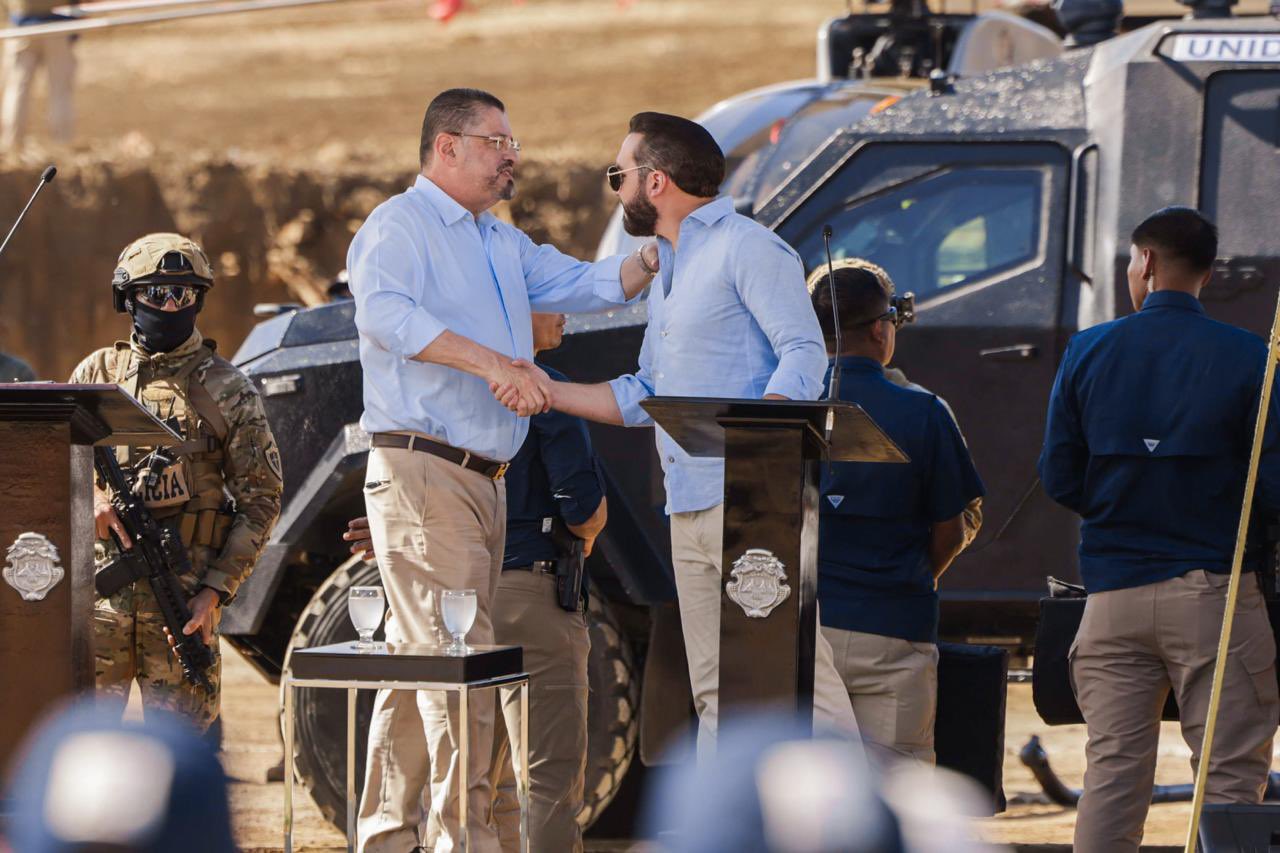
El Salvador’s President Nayib Bukele, accompanied by his official delegation, arrived at the site where the new facilities of the Center for the High Containment of Organized Crime (CACCO) are being built. Costa Rican President Rodrigo Chaves welcomed Bukele, marking the start of the cornerstone-laying ceremony.
“Thank you very much to President Rodrigo Chaves and his cabinet for this invitation,” Bukele said, noting that this was his fourth meeting with the Costa Rican leader in the past two years.
In his address, Bukele stressed that insecurity is a problem that undermines all aspects of society. “When insecurity advances, jobs collapse, education becomes more difficult, and the economy slows down. People stop going out, businesses close early, investment leaves, and tourism disappears,” he said.
The Salvadoran president warned that if crime continues to grow, it can turn into a parallel government—“the dictatorship of gangs, criminals, and drug traffickers.” He added that this situation has not yet occurred in Costa Rica and that the country is still in time to prevent it.
-

 International3 days ago
International3 days agoDeath toll from southern Spain train crash rises to 40
-

 International5 days ago
International5 days agoU.S. deportation flight returns venezuelans to Caracas after Maduro’s ouster
-

 Central America3 days ago
Central America3 days agoGuatemala raises police death toll to nine after gang violence escalates
-

 Central America4 days ago
Central America4 days agoGuatemala prison uprisings leave 46 guards held by gangs
-
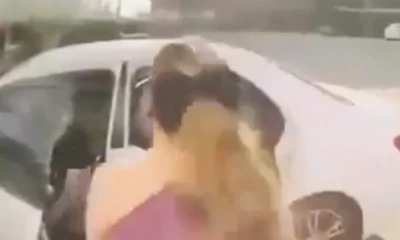
 International14 hours ago
International14 hours agoMexican influencer “La Nicholette” kidnapped in exclusive area of Culiacán
-

 International3 days ago
International3 days agoOver 160 christian worshippers kidnapped in Kaduna Church attacks
-

 International2 days ago
International2 days agoDaily Mail publisher insists reports relied on legitimate sources amid privacy trial
-

 International4 days ago
International4 days agoChile declares state of catastrophe as wildfires rage in Ñuble and Biobío
-

 International2 days ago
International2 days agoGermany says football bodies alone will decide on possible World Cup boycott
-

 International5 days ago
International5 days agoFormer South Korean President Yoon sentenced to five years in prison
-

 International3 days ago
International3 days agoSpain’s Prime Minister pledges transparency after train crash kills at least 39
-

 International14 hours ago
International14 hours agoTrump announces preliminary NATO agreement on Greenland, suspends tariffs on Europe
-

 International14 hours ago
International14 hours agoMajor winter storm to blanket U.S. and Canada with snow, ice and arctic cold
-
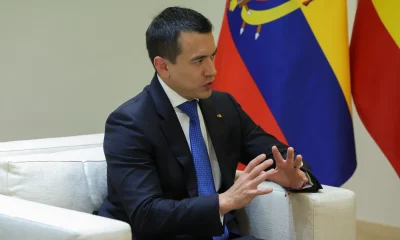
 International13 hours ago
International13 hours agoColombia slams Ecuador’s 30% tariff as ‘economic aggression’
-
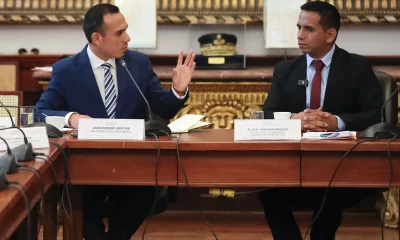
 International13 hours ago
International13 hours agoJosé Jerí claims destabilization attempt after videos of secretive meetings surface


























